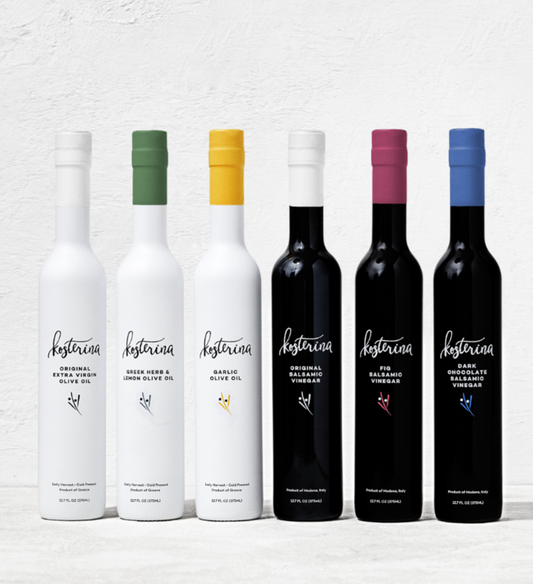With so many oils on the market, it’s tough to decipher which is good for you. Extra virgin olive oil and avocado oil are hailed as good sources of healthy fats, but how do they compare in health benefits and overall?
The Benefits of Avocado Oil
Avocado oil is a type of oil extracted from the pulp of avocados, a fruit native to Central America. It is rich in monounsaturated fatty acids, vitamins E and K. It also contains antioxidants and carotenoids, which lower inflammation and support eye health.
The Benefits of Extra Virgin Olive Oil
There are A LOT of incredible benefits of extra virgin olive oil. The best one? It is tied to overall longevity. Longevity means exactly what it sounds like - living a long time. Those who consume 100% extra virgin olive oil consistently can actually increase their lifespan.
One statistic from the study really stood out to us was that consuming half a tablespoon of olive oil per day was associated with a 16% lower risk of cancer mortality, compared to consuming no olive oil at all. Continue reading the benefits of EVOO here.
How do they differ in taste?
As for taste, avocado oil can be nutty and carries the flavor of avocado compared to olive oil’s rich and peppery flavor. They each have their unique flavor and which is better is a matter of preference.
The Nutritional Line-up
Let’s take a look at a nutrient comparison between the two, with data from the USDA.
| Nutrient (1 Tablespoon) | Olive Oil | Avocado Oil |
| Calories | 120 | 120 |
| Total Lipid | 14 G | 14 G |
| Saturated Fat | 2 G | 2 G |
| Monounsaturated Fat | 10 G | 10 G |
| Polyunsaturated Fat | 1.5 G | 2 G |
| Vitamin E | 33% of the DV | 23% of the DV |
(Healthline, 2016)
EVOO and avocado oil share very similar nutritional profiles, with similar fatty acid profiles and calories. Both contain monounsaturated fatty acids, known to improve heart health. Extra virgin olive oil and avocado oil also contain antioxidants, which may prevent against heart disease and cancer. Of course, the nutritional benefits of both depend solely on their quality. Extra-virgin and cold-pressed oils are the least refined, meaning they’re not stripped of the good stuff that make them healthy in the first place.
So, Who Can Take the Heat?
The rule of thumb when you're cooking at high temperatures (sauteing, deep-frying, or stir-frying) is to make sure you're using fats with smoke points at or above 400°F. Although avocado oil has a higher smoke point than olive oil (it can reach 500°F, while Kosterina’s Everyday Extra Virgin Olive Oil contains a cooking point of ~425° F) what matters is the quality of the oil you cook with. Chefs or dietitians swear by its ability to enhance or compromise both the taste and nutrition of your meal. So, which is the healthier choice? Both avocado oil and extra virgin olive oil make an excellent choice for high-heat cooking, but when you compare the nutritional benefits, extra virgin olive oil is the clear winner.
Is Avocado Oil or Olive Oil Healthier Overall?
We’ll cut straight to the chase—although avocado oil is also a nutritious addition to your diet, extra virgin olive oil has more proven health benefits thanks to powerful polyphenols that reduce inflammation and are known to promote longevity. EVOO is also higher in Vitamin E. While avocados themselves have been widely studied, avocado oil and its potential health benefits remain unknown. In conclusion, EVOO health benefits are bountiful and have been proven, making it a safer healthy option.







